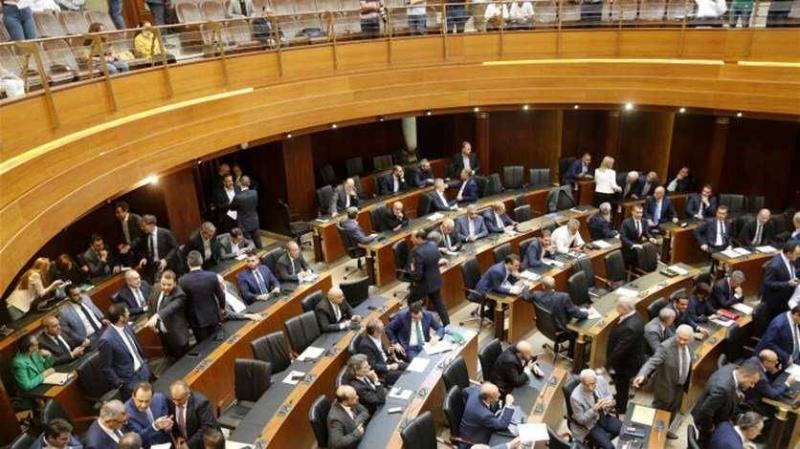The preliminary paper of parliamentary recommendations to the government outlines 9 points: "The parliamentary council convened in its plenary session on 15/5/2024, after listening to the Prime Minister and the honorable members regarding the European aid package and the Syrian displacement file, unanimously resolved to recommend the following:
Lebanon has been suffering for more than 13 years from the problem of Syrian displacement, with the number of those who have entered exceeding two million displaced individuals, representing 44% of the population, without precise and comprehensive records managed by the relevant official authorities. Consequently, controlling and organizing their movement has become difficult due to the lack of cooperation from the United Nations High Commissioner for Refugees (UNHCR), under various pretexts concerning the delivery of the existing lists of displaced individuals in their possession and amid moral protection from some countries and agencies that encouraged their stay in Lebanon for either political motives or due to their unwillingness to absorb part of them.
The Syrian displacement has had economic, financial, social, security, environmental, and overall stability repercussions on Lebanon, with a growing sense of concern among the Lebanese about demographic and societal changes. Conversely, this highly complex and dangerous issue has become one of the primary matters uniting the Lebanese from a national standpoint, rejecting any approach rooted in racism or targeting beyond legal frameworks.
Lebanon, for many social, economic, and demographic considerations, and as it is not a country of asylum, is not constitutionally, legally, or practically prepared to be one. This has been emphasized in the memorandum of understanding signed between the Lebanese government, represented by the General Directorate of General Security, and the UNHCR's regional office on 9/9/2003, published in the official gazette No. 52 on 13/11/2003, which remains valid and organizes the relationship between the state and the agency, confirming the need to return the displaced to their original homeland or resettle them in a third country.
Based on this introduction and the supervisory role of the parliamentary council, and in adherence to the constitution, laws, and the aforementioned agreement, and with the aim of returning the illegal Syrian residents in Lebanon to their country within a maximum period of one year from this date, the council recommends the government as follows:
1. Establish a ministerial committee chaired by the Prime Minister, including the Ministers of Defense, Interior, Displaced Persons, Social Affairs, the leadership of the army, General Security, Internal Security, and State Security, to communicate and closely follow up with international, regional bodies, and relevant authorities, especially with the Syrian government, and to put in place a detailed timeline for the return of the displaced, excluding special cases protected by Lebanese laws as determined by the committee.
2. Reaffirm Lebanon's commitment to the provisions of the aforementioned agreement as the basis for addressing the issue and obligate the Refugee Agency, through diplomatic means, to implement all its provisions, take necessary execution measures, provide statistics and files regarding displaced individuals in its possession, and request coordination with its office in Syria to facilitate their return.
3. A clear commitment to implementing extant laws regulating the process of entry into, residency within, and exit from Lebanon, particularly the law issued on 10/7/1962 and its relevant implementing decrees, especially Decree No. 10188 dated 28/7/1962, along with Lebanese labor laws, tax laws, municipal fees, and others.
4. Carry out the necessary legal measures to hand over prisoners among the displaced to the Syrian authorities according to the applicable laws and regulations.
5. Call upon the international community and donor organizations to assist the government in allocating necessary resources for military and security agencies to control the land borders and coordinate with the Syrian side to assist from their end, limiting the movement of entry and exit through the legitimate crossings between the two countries.
6. Request all UN agencies, especially the Refugee Agency and international and European donor agencies, to adopt the provision of financial and humanitarian incentives to encourage the return of displaced individuals to their homeland through the Lebanese state and its institutions or with its approval and not allow the exploitation of this matter to imply consent for their continued stay in Lebanon, encouraging these agencies to secure such provisions within Syria.
7. Take advantage of the decisions issued by the United Nations, including its decision regarding the Early Recovery Plan issued in 2021, which could serve as an entry point to expedite returns to Syrian territory through aid for infrastructure rehabilitation without exposing donor countries to Caesar Law sanctions.
8. Convey a clear message to the countries and bodies involved in the displacement file that Lebanon can no longer bear the task of being a barrier against the transfer of displaced individuals to other countries, and that, in any case, its mission will not be to protect the borders of these countries against the potential movement of displaced individuals wishing to leave Lebanon by any possible means. Therefore, the primary responsibility is to redirect support towards facilitating the transition of displaced individuals and ensuring their stability in their homeland, including providing the essentials of living.
9. The government's commitment to this recommendation and providing a report to the parliamentary council every three months regarding the stages of implementing what has been included."




